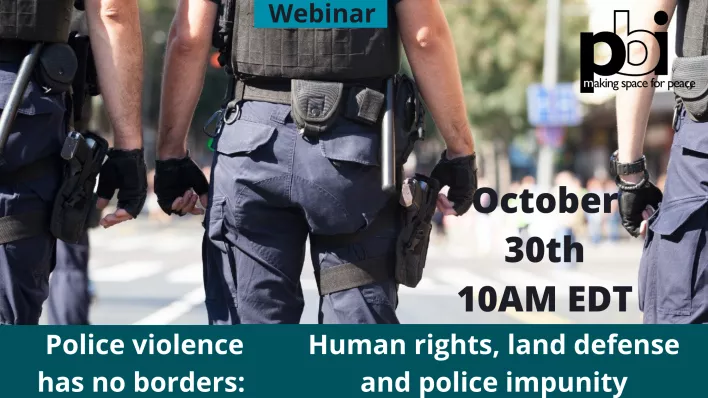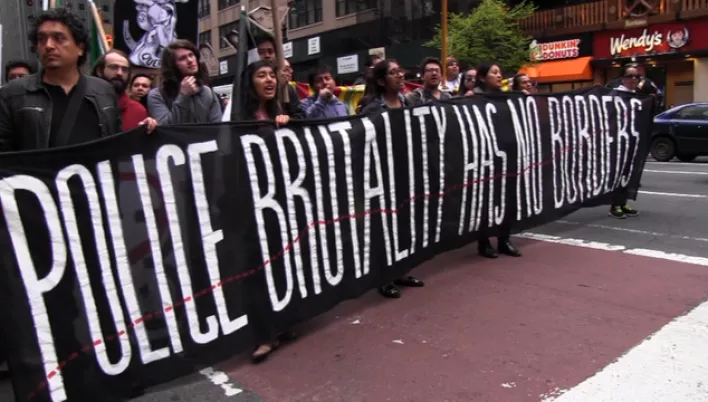
The killings of George Floyd and Breonna Taylor have dominated headlines and led to accelerated calls for police reform in the United States. State violence to suppress social movements is an international issue. PBI has witnessed police violence and repression used to silence defenders across the world for the past 40 years, a trend which has increased over recent years putting democracies at risk.
In this webinar, we will discuss the issue of police violence featuring defenders from Kenya, Guatemala, Nicaragua, Colombia, and Canada sharing their experiences and analysis. To register for the webinar, please click here.
The webinar will raise issues of the disproportionate levels of police violence against Black, Indigenous, and poor peoples, the role that the police play in facilitating the construction of extractive projects that lack Indigenous free, prior, and informed consent, and the violence that comes with the militarization of their operations and the lack of credible oversight and accountability, among other concerns.
Spanish and English interpretation will be available.
DETAILS
DATE: Friday October 30th, 2020
TIME: 10:00 AM - 12:00 PM (EDT, Washington, DC time)
MODERATOR: Pat Davis, Advocacy Director, Peace Brigades International
PARTICIPANTS:
- Faith Kasina, Kenya: Faith Kasina is the co-convener of the Social Justice Centers Working Group (Uhai Wetu), the co-founder and coordinator of the Kayole Community Justice Center in Nairobi, Kenya, and is a field assistant with the Peace Brigades International-Kenya Project.
- Colectivo Nicaragua Nunca Mas +, Nicaragua: Colectivo de Derechos Humanos Nicaragua Nunca + is a group committed to the full validity of human rights, accompanying the population victim of human rights violations in the processes of truth, justice, reparation and guarantees of non-repetition, through actions, documentation, national and international denunciation, articulation of networks and national and international alliances, use of international mechanisms for the protection of human rights and systematization of information that allow the construction of Nicaraguan historical memory.
- Peaceful Resistance La Puya, Guatemala: The Peaceful Resistance works in the municipalities of San Jose del Golfo and San Pedro Ayampuc, department of Guatemala. The Resistance has expressed their disagreement with the planned mining project in their municipalities, defending their right to water and a healthy environment. The Peace Brigades International-Guatemala Project has accompanied the Resistance of La Puya since November 2012.
- Berenice Celeita of the Nomadesc Association, Colombia: Founded in 1999, the Association for Social Research and Action (Nomadesc) is a human rights organization that advises and accompanies organizations working on social, trade union, civic, indigenous, afro-descendant, agricultural and women’s issues.
- Germán Romero from dhColombia, Colombia: dhColombia, aims to promote, disseminate, protect and defend human rights, with the purpose of achieving peace, understood as the improvement of the political, social, economic, cultural and environmental conditions of Colombian society. It is an interdisciplinary group that assumes the comprehensive defense of victims of human rights violations, either individually or collectively.
- Victor Hugo, Colombia: Victor is the former senior advisor and legal representative of the Association of 43 Community Councils of Northern Cauca (ACONC) representing 209 Afro-Colombian communities and their collective and ancestral territories. Currently he is still an active member of the Pandao Community Council of ACONC. He spent most of his life defending the ethnic and territorial rights of the black Afro-Colombian people in the face of natural resource exploitation, such as gold mining, the onslaught of the armed conflict and denial of the right to land and self-determination.
- Russ Diabo, Canada: Russ is a member of the Mohawk nation of Kahnawake, a well-known policy analyst and adviser, and a prominent critic of the Canadian government’s resource extraction, assimilation and “reconciliation” agenda. Beginning in 1987, Russ has been taking Indigenous rights and environmental issues to international forums, notably the United Nations in New York and Geneva.
Follow us on Twitter, Facebook and Instagram and join the conversation with #PBIaccompanies.

Photo by PBI-Canada.
